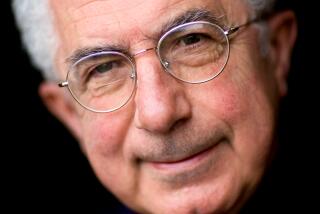Strobe Talbott’s Ideas and Their Consequences : Now that his thoughts affect more than magazine readers, the Senate must closely examine his prior writings.
- Share via
Strobe Talbott, the deputy secretary of state-designate, was more than a mere reporter during his days as chief diplomatic correspondent and editor-at-large of Time magazine. He was, rather, an advocate for a distinctive interpretation of the Cold War, and particularly of its endgame.
Now that he is playing a large, even dominant, role in formulating U.S. foreign policy, Talbott’s understanding of the recent past is of more than antiquarian interest. For the way Talbott thought about the collapse of European communism is clearly shaping the way he is thinking about the future. And, as the recent NATO summit demonstrated, the way Talbott is thinking about the future is likely to become the way the United States government thinks about the future of post-communist Central and Eastern Europe.
Thus, senators questioning Talbott at his upcoming confirmation hearings might well revisit some of his more provocative analyses of the history of the 1980s--not to settle the ongoing argument about who won the Cold War and how, but to determine how Talbott’s understanding of the revolution of 1989 shapes his vision of U.S. policy in the 1990s. Senators so inclined might begin with Talbott’s essay, “Rethinking The Red Menace,” from the Jan. 1, 1990, issue of Time--the issue that proclaimed Mikhail Gorbachev “Man of the Decade.” Based on that essay, here are the questions it would be interesting to hear Talbott address:
* Do you still believe that “Gorbachev . . . had a near monopoly on the promulgation of bold ideas” in the endgame of the Cold War? Did President Reagan or Prime Minister Thatcher or Pope John Paul II have any “bold ideas” during the 1980s? How about Lech Walesa? Or Tadeusz Mazowiecki? Or Vaclav Havel?
* You placed enormous stress on Gorbachev’s role in breaking our “grand obsession” with the Cold War. Psychiatry aside, how does your judgment on Gorbachev’s singular role in the 1980s shape your judgment on Yeltsin’s distinctive role in the 1990s? We all want Yeltsin to succeed. But given his dire economic problems, we wonder why Yeltsin has proposed a Yalta II in which the West and Russia would decide the fate of East-Central Europe. Is Yeltsin vulnerable to neo-imperialist pressures within his reform coalition? And if so, isn’t that a more immediate threat than the ravings of Vladimir V. Zhirinovsky?
* Would you explain your claim that “for more than four decades, Western policy (was) based on a grotesque exaggeration of what the U.S.S.R. could do if it wanted to?” Did Harry Truman, Dean Acheson and Arthur Vandenberg “grotesquely exaggerate” the Soviet threat after World War II? Did Dwight Eisenhower in the mid-1950s? Did John F. Kennedy in 1961? Doesn’t the suggestion that they did imply that the Cold War was really the West’s fault? What does that implication suggest about U.S. policy today?
* You wrote that “scenarios for a Soviet invasion of Western Europe . . . always had a touch a paranoid fantasy about them.” Do Walesa’s and Havel’s concerns about a post-communist revival of Russian imperialism exhibit “a touch of paranoid fantasy”? How do you read Russian Foreign Minister Andrei V. Kozyrev’s assertion of a historic Russian sphere of influence in east-central Europe? Prior to the arrival of the Red Army in 1945, when had Russia ever asserted an interest in Prague?
* You wrote that “the doves in the Great Debate of the past 40 years were right all along.” What role do you think NATO military modernization played in the endgame of the Cold War? How did the Strategic Defense Initiative influence Soviet negotiating behavior in the late 1980s? What role does other states’ military capability play today in shaping Russian understanding of the Russian role in East-Central Europe and in the “near abroad” of the former Soviet republics?
* Did human-rights activism behind the Iron Curtain influence the collapse of communism? Your own writings focus on what happened “at the highest level.” Do you believe that democracy and the free market will be consolidated in Russia primarily from the top down? What role do democratic and entrepreneurial activists at the grass-roots level play in stabilizing post-communist Russia?
Ideas, as ever, have consequences. Strobe Talbott’s ideas could have great impact, for good or for ill, on the history of the 1990s. They deserve the closest critical scrutiny.


